初一下册英语第5单元课件
- 格式:docx
- 大小:17.98 KB
- 文档页数:11
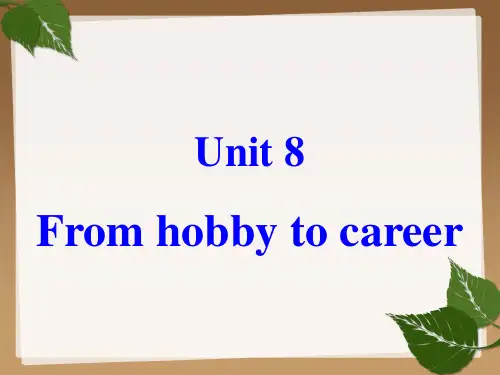
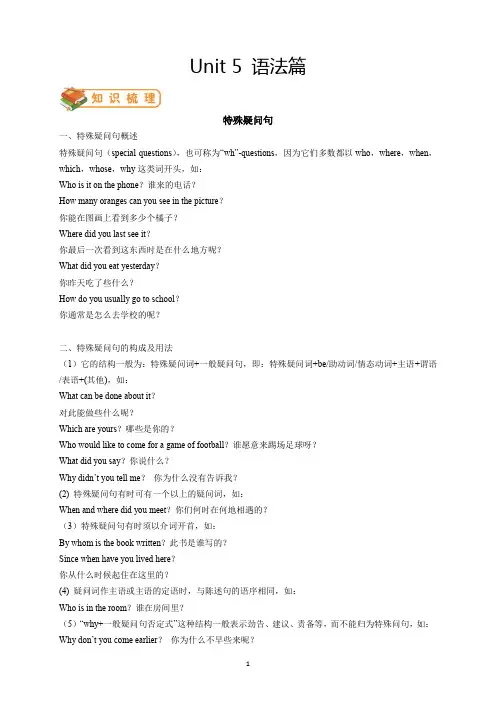
Unit 5 语法篇特殊疑问句一、特殊疑问句概述特殊疑问句(special questions),也可称为“wh”-questions,因为它们多数都以who,where,when,which,whose,why这类词开头,如:Who is it on the phone?谁来的电话?How many oranges can you see in the picture?你能在图画上看到多少个橘子?Where did you last see it?你最后一次看到这东西时是在什么地方呢?What did you eat yesterday?你昨天吃了些什么?How do you usually go to school?你通常是怎么去学校的呢?二、特殊疑问句的构成及用法(1)它的结构一般为:特殊疑问词+一般疑问句,即:特殊疑问词+be/助动词/情态动词+主语+谓语/表语+(其他),如:What can be done about it?对此能做些什么呢?Which are yours?哪些是你的?Who would like to come for a game of football?谁愿意来踢场足球呀?What did you say?你说什么?Why didn’t you tell me?你为什么没有告诉我?(2) 特殊疑问句有时可有一个以上的疑问词,如:When and where did you meet?你们何时在何地相遇的?(3)特殊疑问句有时须以介词开首,如:By whom is the book written?此书是谁写的?Since when have you lived here?你从什么时候起住在这里的?(4) 疑问词作主语或主语的定语时,与陈述句的语序相同,如:Who is in the room?谁在房间里?(5)“why+一般疑问句否定式”这种结构一般表示劲告、建议、责备等,而不能归为特殊问句,如:Why don’t you come earlier?你为什么不早些来呢?Why not go skiing?为何不去滑雪呢?三、特殊疑问词特殊疑问词可分为两类:疑问代词和疑问副词(1)疑问代词疑问代词主要有五个,分别为:who,whom,which,what,whose。



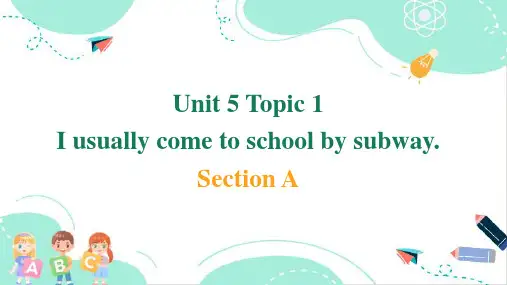

人教版七年级下册英语Unit 5 说课稿一. 教材分析人教版七年级下册英语Unit 5主要讲述了日常生活中的一些活动,如做家务、上学、看电影等。
本单元的核心词汇有housework, homework, watch, read, sports 等,同时本单元还涉及到一般现在时的用法。
通过本单元的学习,学生能够掌握日常生活中的一些基本表达,并能用英语描述自己的日常活动。
二. 学情分析七年级的学生已经具备了一定的英语基础,能够进行简单的英语交流。
但是,部分学生对于一般现在时的用法还不是很清楚,需要老师在教学中进行详细的解释和引导。
此外,学生在口语表达方面还存在一定的困难,需要老师提供更多的机会进行实践和锻炼。
三. 说教学目标1.知识目标:学生能够掌握Unit 5中的核心词汇和短语,理解一般现在时的用法。
2.能力目标:学生能够用英语描述自己的日常活动,进行简单的交流。
3.情感目标:通过学习,学生能够培养对英语的兴趣,增强学习的自信心。
四. 说教学重难点1.重点:学生能够掌握Unit 5中的核心词汇和短语,理解一般现在时的用法。
2.难点:学生能够运用一般现在时描述自己的日常活动,并进行口语交流。
五. 说教学方法与手段1.教学方法:采用任务型教学法,让学生在实际操作中掌握知识,提高能力。
2.教学手段:利用多媒体课件、图片、卡片等辅助教学,增加课堂的趣味性。
六. 说教学过程1.导入:通过展示图片,引导学生谈论自己喜欢的活动,引出本课主题。
2.新课呈现:通过多媒体课件,展示本课的核心词汇和短语,讲解一般现在时的用法。
3.操练:学生分组进行角色扮演,运用一般现在时描述自己的日常活动。
4.巩固:学生完成课堂练习,检测对知识的掌握情况。
5.拓展:引导学生谈论自己的梦想,用英语表达对未来生活的期望。
6.总结:对本课内容进行总结,强调一般现在时的用法。
七. 说板书设计板书设计如下:人教版七年级下册英语Unit 5核心词汇:housework, homework, watch, read, sports等一般现在时:主语 + 动词原形八. 说教学评价1.课堂参与度:观察学生在课堂上的参与情况,是否积极回答问题,参与讨论。
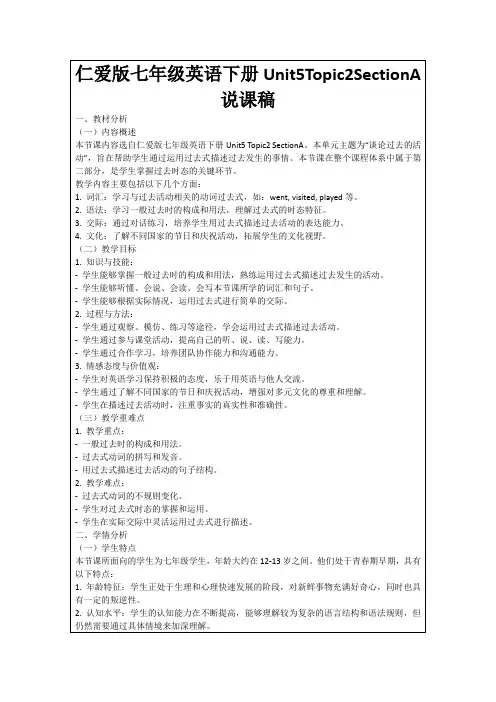
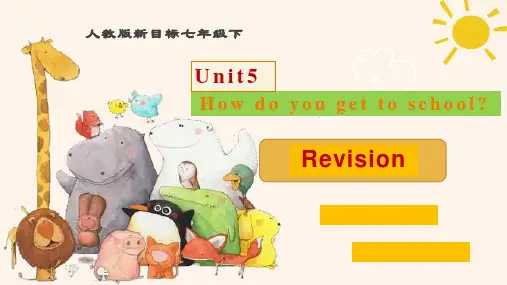


初一下册英语第5单元课件The First PeriodStep 1. Greeting1. Greet the Ss ,using the following :---Happy New Year!---The same to you.---Nice to see you!--Nice to see you ,too.2. Talk about new wishes for the new year ,using the topic”The early bird catches the worm.”Good morning, everyone! A new term is coming. Last term, we made great progress in English and our school life. After a long winter holiday, I think most of us may become lazy. That’s too bad.As we know , the early bird catches the worm. Let’s get up early and come to school on time. Listen to our teacher carefully and do our homework carefully. Do sports and keep healthy. Let’s help each other and learn from each other, OK?Thank you for listening!Step 2 Presentation1. Teach the advs about frequency by talking the T’s daily activities by presenting the following on the Bb.I’m always busy.I usually get up at 6:30 in the morning.I often have milk and bread for breakfast.I sometimes come to school by bus. Sometimes I come by car.I seldom go home by taxi.I never go home by train or by plane.2. Get the Ss to explain the meanings of the advs and then complete the chart in 1b, Section B.3. Remind the Ss the positions of the advs in the sentences , pay more attention to “sometimes.”.4. Get the Ss to find out the words about means of transportation .Then ask them to say more and write them down . Then finish 2a. Section . Present the following on the Bb.by bike / motorbike/bus /car/taxi/train/subway(underground)/plane(air)/ship(sea)/ boat (water)/on footStep 3 Practice1. The T talks about how she comes to school .My home is far from our school. So I sometimes come to school by bus. Sometimes I come by car because I can’t ride a bike or drive a car. Ask some Ss some questions. Then get the Ss to practice the following in a chain drill.----How do you usually come to school?----I usually come to school on foot/ by car---.What about you?--- I usually come to school by bus---2. Practice the following in pairs while the other Ss are talking about how they come to school .---How does A usually come / go to school?---He / She usually comes / goes to school ---3. Look at pictures in 1b. Talk about how the kids come / go to school by asking and answering questions.4. Choose the right sentence for each picture.Step 4 Make a surveyUse the from in Part 3 and hand out the form to the leader of each group and get them to make a survey .Then give a report to the class.Step 5 Listening1. Listen to 2b. Match the means of transportation with the right people. Ask the Ss to write down the sentences is there is time.Mr. Zhang often goes to Shanghai by plane.---2. Listen to 1a. Answer the questions :(1) Does Kk have a new bike?(2) How does Kk usually come to school?(3) How does Helen usually come to school? How about Jane?3. Retell the dialog using the following passage:It’s a new term . Kk meets Helen and Jane at the school gate. Kk has a new bike. It looks very nice. He often comes to school by bike. Helen usually comes to school by subway. Jane always comes to school by bus.4. Get the Ss to practice similar conversations in groups in the next period.Step 6 Homework1. Copy and recite 1a.2. Make 6 sentences with the advs of frequency.3. Write a passage ,using the information in 2 b.4. Preview 1a and 2a in Section B.The Second PeriodStep 1 Revision1.Duty report The Early Bird Catches the Worm2,Review the advs of frequency by going through the dialog in 1a .After listening and reading, circle the advs.Explain the difficult points if necessary.3.Act out the similar dialog in 1a , Section A in groups.Step 2 PracticeGet the Ss to practice the advs by making sentences. Try to use the advs as many as possible.eg. I usually come to school by bike. Sometimes I come to school bybus. I never come to school by car.Step 3. Presentation1. Talk about the pictures in 2a ,using:---How does Maria sometimes go home?---She sometimes goes home by subway.Practice the rest pictures in the same way.2..Read the sentences in 2a. Then complete the sentences. Get them to pay attention to the similar sentences.(1) Maria sometimes goes home _______ __________.→Maria sometimes ________ ________ _________home.(2) Li Xiang often comes to school ______ _____.→Li Xiang often goes to school ______ _____ _______.→Li Xiang often _______ __________ _______ to school.(3) We usually go to the park _________ _________.→We usually __________ __________the park.(4)They always go to the zoo _______ ________.→They always _______ _______ ______to the zoo.3.Present more sentences like the above.(5)They often go to Beijing by plane.They often _____ ______Beijing.(6)My father goes to Guangdong by car.My father __________ ______ ___________to Guangdong.Step 4 ConsolidationShow a form on the Bb to let the Ss learn them by heart.Step 5 Presentation1.The T talks about her weekends, using the phrases in Part 2 and Part 3 in Section.C. While listening, ask the Ss to find out and underline the phrases they hear.I ‘m always happy at weekends. I usually meet my friends and go shopping with them. Sometimes I watch TV or listen to music at home. I like to cook for my family , too. It’s fun. I can cook nice food. I seldom go to the park or the zoo. I never go fishing or go swimming.2. Get the Ss to ask and answer like the following:---What do you usually do after school?---I usually meet my friends. (play soccer/ play basketball/go swimming / go fishing /go shopping/ go to the zoo / go to the park/ watch TV / see a movie /listen to music/ play computer games---)Step 6 Practice1.Practice the short dialog in Part2. in pairs.---What does Hai Qing usually do after school?--He usually plays soccer, but he doesn’t play basketball.2.Teach “How often do you---?”by asking and answering questions like the following:----Do you often meet your friends?---Yes, I do. / No , I don’t.----How often do you meet your friends?----Very often. / Every day./ Seldom / Never.Once a week. / Twice a week. /Three times a week.3. Make sentences ,using the phrases of frequency.Step 7 Consolidation1. Listen to Part 3 in Section B. Then check the answers.2.Try to retell the passage. Then ask the Ss to write down the passage after class.Step 8 Homework Write a passage ,using the information in Part 3.Section B.The Third PeriodStep 1. Revision1. Duty report. Get the Ss to talk about their daily activities. Try their best to use the advs of frequency.2. Revise the similar sentences taught in 2a, Section B by translating sentences in different ways.Step 2 Practice1. Listen to Part 3, Section D. Then check out the answers.2. Ask questions about the sentences.eg. (1)How does Miss Yang always go to Wuhan?(2)How often does Mr. Rui go to Nanjing by train?(3)How does Mr. He sometimes go to his office?(4)How does Ms.Wang often go to the Great Wall?(5) How often does Tom go to Xi’an by bus?Step 3. PracticeAsk and answer questions about the Ss daily life.(1) ---What time do you usually get up -------I usually get up at ---have breakfast go to school have lunch play soccer go home / get home do one’s homework go to bed(3) What time do classes begin in the morning? (2) How many classes do you have in the morning and in the afternoon?(4) What do you often do after school?(5) How often do you play soccer?(6) What do you often do after dinner?Step 4 Presentation1. Lead to the passage in Part 2, Section D. Get a student or two to change the subject “Jane “into “I “and read the passage. While he/ she is reading, the others complete the table as quickly as possible.2. Check out the answers by answering the questions.What time does Jane ---?What does she do at ----/ after---?3. Read through the whole passage and find out the difficult points. Explain them if necessary.(1) Classes begin at eight.(2)She takes the subway home.(3) She gets home at five thirty.(4) She often does her homework and then watches TV for a little while/ for a short timeStep 5. ConsolidationGuide the Ss to talk about their daily activities . If there is time,get one or two Ss to talk about it in class.Step 6. HomeworkWrite a passage with the topic “My Day.”The Fourth PeriodStep 1.Revision1. Duty report. Get some Ss to talk about “My Day.”2. Say something about “Jane’s Day”by using the key words on the card.Step 2. Practice1. Get a student to act as Michael and introduce his school life ,The passage may come from 1a. Section C.Hello! I ‘m Michael. I come from the U.S.A. Now I ‘d like to talk about the school life of the American Ss. They usually take a school bus or walk to school. Very few Ss ride bikes to school. They often have lunch at school. They seldom eat out on weekdays. They don’t have a short rest after lunch. Classes begin at 1:30 in the afternoon. School is over at 3 :00. In their free time, they often play basketball or soccer, go swimming and so on, They have ball games four times a year.2, Answer the questions in 1B after listening.3. Get another Ss to act as a Chinese Ss and talk about the school life of the Chinese Ss.Hello! My name is ---I ‘m from China. I think our school life is different from that of the American Ss. We usually come to school by car or by bike. We usually have lunch at home or at school. We can have a short rest after lunch. Classes begin at 2 o’clock in the afternoon. School is over at 4:45. We can’t do many things after school because we are busy, We have to do much homework.Step 3 Consolidation’Show a form to compare the differences about the school life between the American Ss and the Chinese Ss.Step 4. Presentation 4. Talk about the differences according to the form1. Present the interview in 1a . The T acts as the interviewer and one Ss acts as Michael. Act out the dialog before the class.2. Get the Ss to listen to the dialog and underline the difficult points. Explain them if necessary.Step5.Pair workPractice the dialog in pairs. Act out the dialog if there is time.Step 6 HomeworkWrite a passage about the school life of the American Ss.搜集整理,仅供参考学习,请按需要编辑修改。